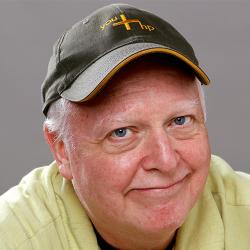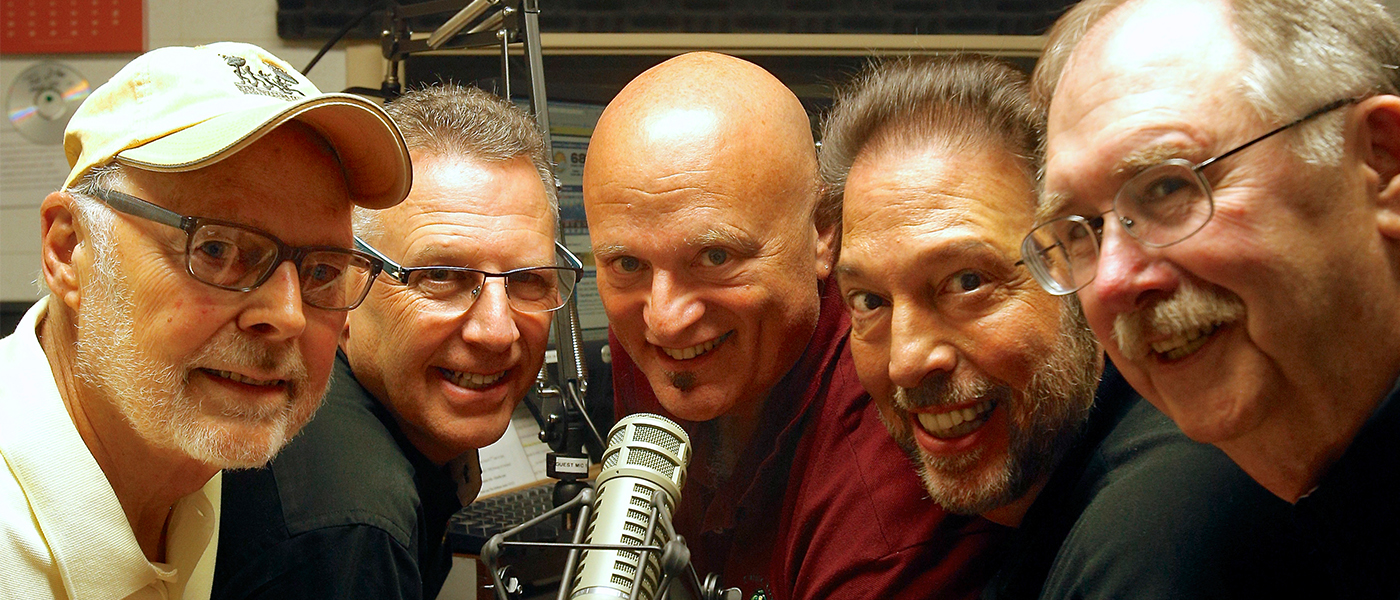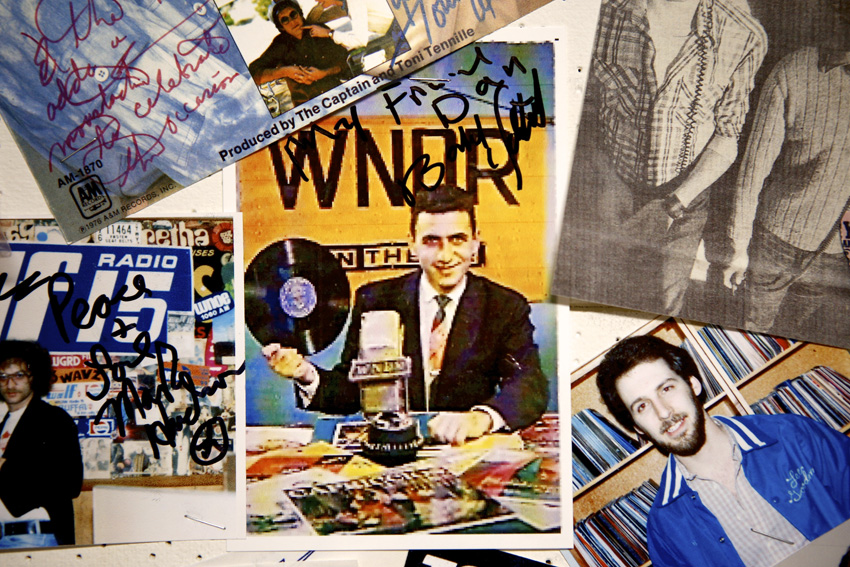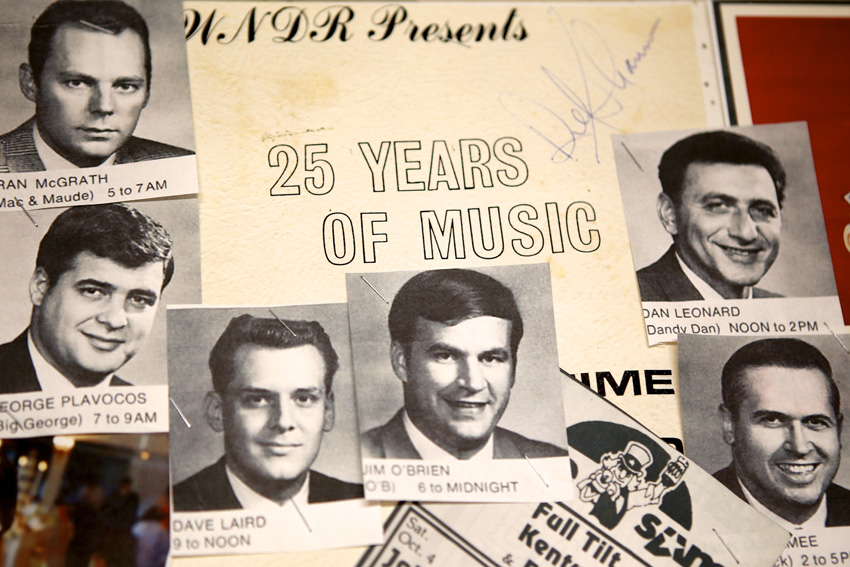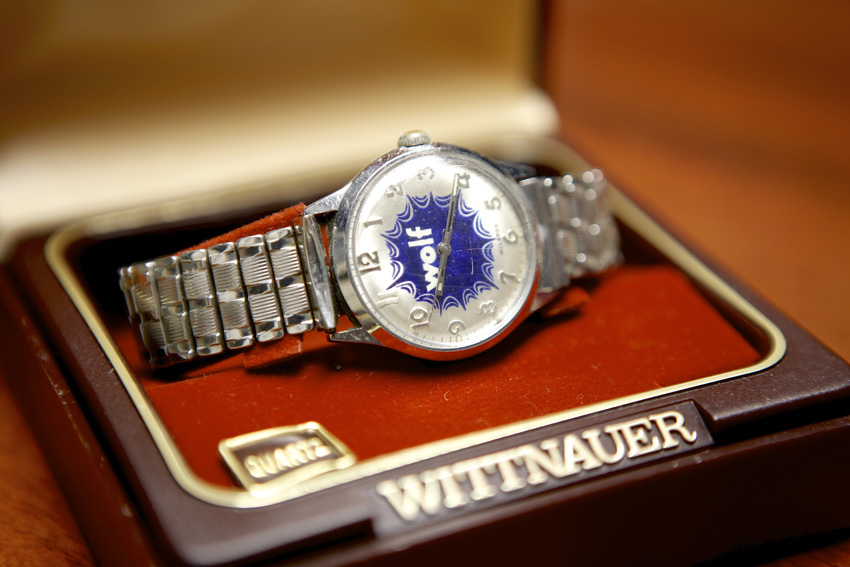It doesn’t take much when it comes to interviewing radio disc jockeys: Just plop a tape recorder in front of them and let the good times roll.
That’s what happened when a gaggle of gabbers gathered to recall five decades of microphone memories for radio stations WOLF and WNDR at the familiar station on 401 W. Kirkpatrick St., near the Inner Harbor. WOLF is celebrating its 75th anniversary, as good a reason as any to mount a live, four-hour reunion broadcast that will air on Saturday, Aug. 8, 9 a.m. to 1 p.m., on the Dinosaur station, with FM frequencies at 94.1, 95.3, 103.7 and 103.9.
Radio listeners from the baby-boomer era will recall the long-ago deejay names scheduled to appear, including Windy Craig, Dick Mastriano, Howie Castle, John Gabriel, Dick Snyder, Gary Vann, Dusty Rhodes and Rick Wright. Chances are good that most of these visitors will also turn up later that night when a free concert featuring local band Smokin’ and a reunion of The Nightcaps will rock away from 8 p.m. to midnight at Pensabene’s Casa Grande, 135 State Fair Blvd.
The assembled unindicted co-conspirators for this bull session included:
WNDR mainstay Fran McGrath, a Le Moyne College graduate and Army veteran who worked alongside the station’s top jocks such as George Plavocos and Dandy Dan Leonard. McGrath would incarnate several different radio characters such as his Count DeCreep monster mash-up and both sides of the morning-drive team Mack and Maude, the latter voiced with as a Jonathan Winters riff. (He would announce the daily school lunch menus, which always featured “milky-do.”) After broadcasting, McGrath turned to sales and handled several successful advertising campaigns for the New York State Fair.
Lee Goodman started as an unpaid WOLF jock at age 15 in 1970, then alternated between WOLF stints and positions in Maryland and Utica. Now serving as host of the Dinosaur’s Saturday-night show, Goodman makes the claim that he is “the longest-running part-timer in Syracuse radio.”
Nick Caplan caught the radio bug in 1971 during his Junior Achievement days. Along the way he took classes at the Columbia School of Broadcasting, lost a finger while working at Chrysler (which pretty much ended his budding music career with the band Carnage), and brazenly struck up a conversation with WOLF’s general manager at Heid’s hot dog stand, which led to popular radio shifts before the rock station’s disastrous format switch to country on July 10, 1981. Caplan returned to West Kirkpatrick in January 2014 with the Dinosaur’s retro Top 40 format, and now handles morning drive with co-host Melissa Midgely.
Ron Wray, dubbed “Syracuse’s rock authority,” is the Salt City’s version of Zelig, somehow getting close to rock’n’roll’s gods and goddesses — and he has the photographic evidence to prove it. At one point in the mid-1960s, Wray even brought along his stacks o’ wax to the station to help flesh out WOLF’s programming. Wray also claimed that his first transistor radio “changed his life,” allowing him to fall asleep each night with his earphones plugged into rock radio.
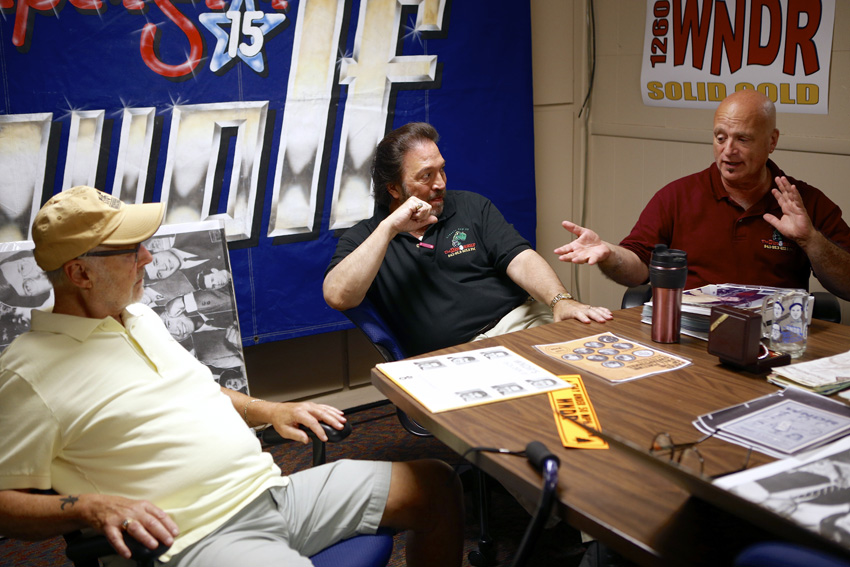
From left to right: Fran McGrath, Bob Brown and Nick Caplan.
Michael Davis Photo | Syracuse New Times
Bob Brown brought his baritone to WNDR in August 1974 after graduating from high school. “I rode in on a canoe because Butternut Creek was overflowing,” Brown recalled about the station’s frequently flooded DeWitt site off Andrews Road. Brown switched back and forth between WNDR and WOLF, at one point resorting to a phone directory listing to change his deejay moniker to Bob Reynolds, all to prevent confusion with fellow jock Charlie Brown. Brown now works the afternoon shift at the Dinosaur.
The interview ran the gamut from recalling the Chickenman syndicated comedy serial, to speeding up songs so that more advertising spots could be squeezed into an hour, to lots of kibitzing about their station colleagues. When Brown revealed that the local drive-ins screened an intermission clip with George Plavocos intoning, “Take someone to church this week. You both will be happier,” McGrath quickly chimed in, “George never said that at Scratch Daniels!”
Fran McGrath: Back then there was only five AM stations; FM was only played in elevators. You had WSYR, WHEN, WNDR, WFBL and WOLF. Compare the radio audience then to the diluted audience now, with so many narrowcast outlets like Sirius XM. It had to be thousands more listeners per quarter-hour.
Lee Goodman: I was applying for a job in Missoula, Montana, and the guy told me, “You worked for WOLF. I want you to come out here.” I was 18 at the time and I said, “Nahhh, I don’t think Montana is the place to go.” And he says, “Let me talk to your father,” and he’s trying to talk my father into going to Montana. But it was because of WOLF’s reputation all over the country.
Fran McGrath: WFBL was known as the last mom-and-pop station in the country because George Plavocos and I were not only on the air in the morning, we would also sell advertising spots. We did that for years, and we had also acquired 93Q, until it got too big for us.
Nick Caplan: Dick Clark was offered to work at both WOLF and WNDR when he was going to Syracuse University. The deciding factor was that WNDR offered $35 a week and WOLF offered $40, so he took the WOLF gig. Clark’s father also ran WRUN in Utica.
Ron Wray: One night in 1966 or 1967, Jim Sims and I were in the control room and in walked Dick Clark, and he said that the station was up for sale and that he was going to bid on it. He said, “Wouldn’t it be great if I owned the station that I first worked at professionally?” But he got outbid at the end by Regional Broadcasting.
Bob Brown: One of my first years at WNDR I interviewed Tom Jones, who was at the War Memorial. They were doing a soundcheck and it sounded awful. Finally after an hour and a half, Tom Jones comes over, introduces himself and says, “I gotta go. Do you want to do the interview in the hotel?” So we go to the Hotel Syracuse and he’s shaving and talking, and I have my little cassette tape going. It was great!
Ron Wray: It was different in those days, especially with security. If we wanted to talk to Neil Diamond, Led Zeppelin, whoever it was, we saw the road manager and he said OK or no, and that was it. You didn’t have to go through this middle management. It didn’t make any difference if it was Jimi Hendrix, Janis Joplin or Eric Clapton, they were all cordial to the media people.
Jimi Hendrix was the nicest freakin’ guy you’d ever want to meet, and the loudest guy I ever heard (at a concert). He said, “Hey, do you remember me? You know that I played here for 10 days a few years ago? I was one of Joey Dee’s Starliters, playing at Lorenzo’s. I played the ‘Peppermint Twist’ and all those songs.”
Fran McGrath: My first venture at WNDR in promoting a show was with Roy Orbison at the Onondaga County War Memorial, but we just put too much stuff into the show, and our (financial break-even) nut was too big. We had Gale Garnett, that singer of “We’ll Sing in the Sunshine,” and even though Orbison had “Pretty Woman,” the No. 1 song in the country, we lost 500 bucks on the show. We tried to deal with his father, O.L. Orbison, who was Roy’s manager and after the show we go pleading poverty and asking if he can give us a break. And he said “Nope.”
The best show we did was Neil Diamond in the parking lot of the Holiday Bowl. It was four bucks a ticket. Here’s another good one: Danny Leonard had Gordon Lightfoot at Suburban Park and he paid him about 75 bucks. So the poor bastard’s driving back to Canada and he gets whacked for a speeding ticket and there went his 75 bucks.
We had the Dixie Cups doing a show on the roof of the refreshment stand at the North Drive-In. And when they started singing, some kid with a BB gun was shooting BBs at the singer’s ass!
Ron Wray: When the WOLF doorbell would go off at night, you’d never know who would be there. One night Carl Wilson from the Beach Boys was there: “Hey, I’m in town tonight, just wanted to stop by and say hello.”
Nick Caplan: When Loverboy came through here, I was doing 7 p.m. to midnight and the doorbell goes off and the band shows up. They just wanted to use the john, and they brought in “Turn Me Loose,” which I threw on the turntable. No one heard it before, and I was the first American deejay to play that record. So the neat thing was that they came back through on Feb. 18, which happened to be my birthday and I went to see them at the Beginnings for a (then-WYYY-FM) Y94 promotion. Then they got me on stage and sang “Happy Birthday,” while (Y94 radio programmer) Tommy Nast looked annoyed.
Fran McGrath: Dan Leonard would make a deal with a group trying to make it. He would say, “You can play the Teen Canteen (a Sunday afternoon showcase at the Three Rivers Inn nightclub in Phoenix) for nothing and I’ll play your record.” So he would play the record for a week and they would come do the show, which made a lot of money since there was no overhead. Then he’d dump the record and never play it again. What an operator!
Ron Wray: Local group Don Barber and the Dukes was really popular at the Teen Canteen. Barber told me, “After we got done, Dandy Dan opens up his wallet and hands me $25. I thought, ‘This is great, this is big money.’ Then he says, ‘Divide it up any way you want between the five guys!’
Fran McGrath: Back in the day we would do contests at WNDR and we’d blow out the DeWitt telephone exchange. People could not make emergency phone calls.
Ron Wray: We had a friend at the station who worked for American Airlines and we got a call saying that John Lennon and Yoko Ono were arriving at Hancock Airport at noon, so Howie Castle and myself got our press passes and at the time you could go out to the plane and they put the ladder down and out comes John and Yoko. And we went into a room at the airport for a press conference and I sat there with my Norelco tape recorder and recorded the whole thing. John thought it was a TV microphone but it was the WOLF mike. Then the Everson Museum had a massive press conference (for Yoko Ono’s exhibit This Is Not Here) and we were there two hours beforehand and we put our microphone right in front. And John, bless his soul, talked right into our microphone. We have the only good audio of the event.
Fran McGrath: Three of us came out of Valley High School and ended up in broadcasting, all from the same class: Mike Price goes into TV (for then-WNYS-Channel 9) and George and I go into radio. Mike gets hotter than hell because of his Baron Daemon character (a comical vampire host), so the WNDR owner Arthur Kyle (nicknamed “The Judge”) said he should come over and do a radio show. But Channel 9 wouldn’t let Mike do it, so George said, “I know a guy that will do it.” So I’m just out of the Army and working as a claims adjuster for Hartford Insurance, and George asked me if I want to do it. So that’s how Count DeCreep got started. And if it wasn’t for Channel 9 saying that Mike couldn’t do the show, I don’t know what the hell I would have ended up doing.
Nick Caplan: I remember listening to Bud Ballou, Dale Dorman, Howie Castle, never expecting to be that guy on 7 p.m. to midnight, I just wanted to play music on the radio.
Bob Brown: I wouldn’t trade my radio career for anything. Even though I wasn’t in the golden age, I worked with guys who were, and the stories are just priceless.
[fbcomments url="" width="100%" count="on"]

